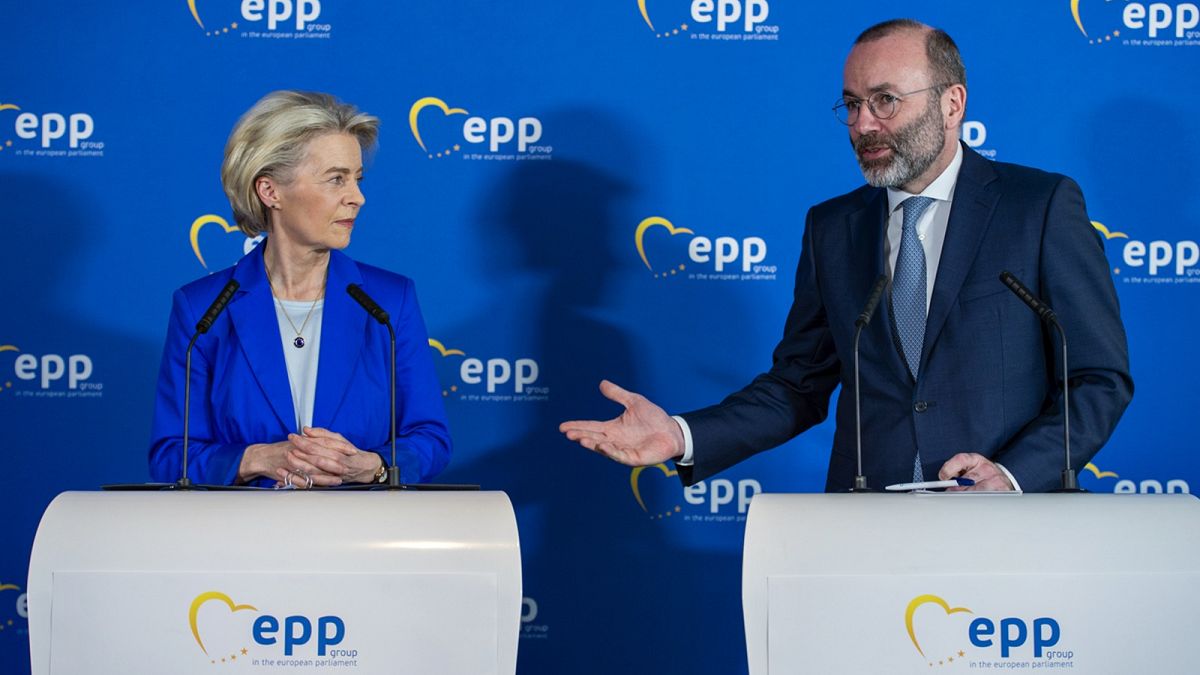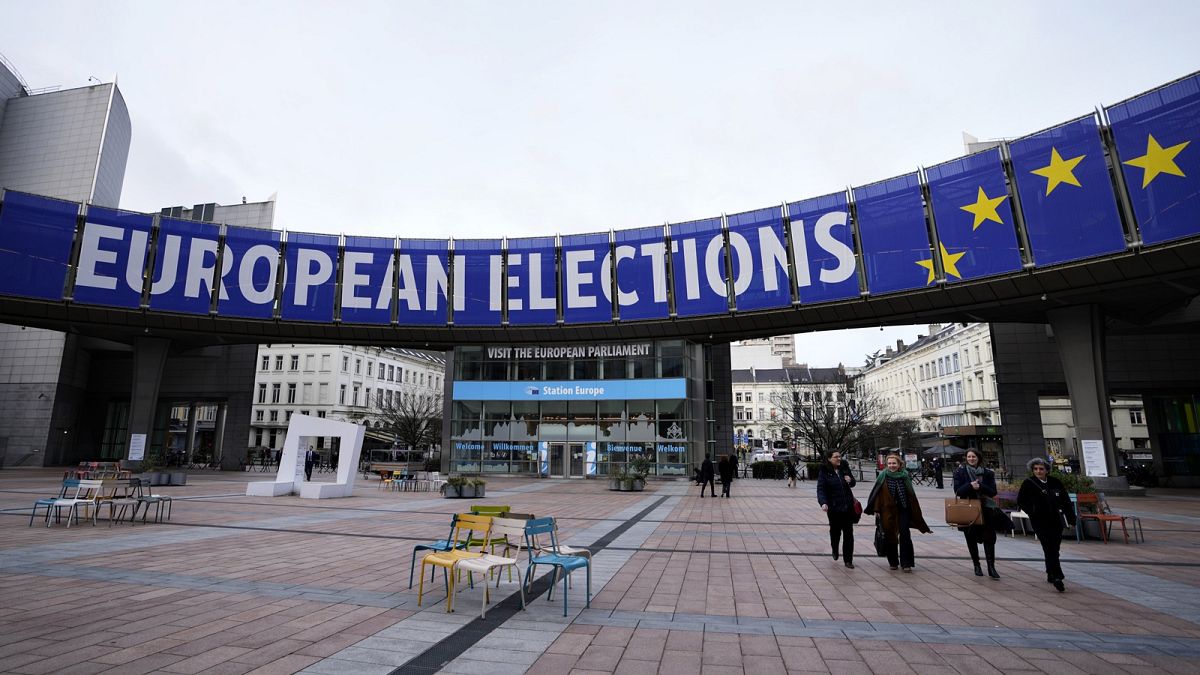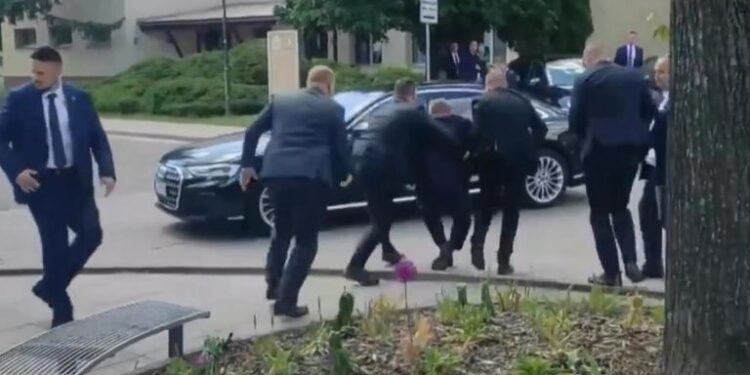by Miceál O’Hurley
BRATISLAVA — Robert Fico, elected in October 2023 to his third, non-consecutive term as Prime Minister of Slovakia, was reportedly shot up-to 5-times by a would be assassin as he left a Government meeting in Handlova, approximately 150km from the capital. Fico’s shooting occurred as he exited a cultural centre where the 59-year old was greeted by a small crowd of Slovakians, most enthusiastically waving and shouting to the Prime Minister. Fico identifies as a populist politician and Euro-skeptic with strong leanings towards Moscow. Although unconfirmed reports vary, sources state that Fico was most seriously wounded in the abdomen and required several hours of surgery where his condition was initially described as “life threatening”. This morning, his condition has been described as “serious” but no longer life-threatening with Slovak Deputy Prime Minster Tomas Taraba telling BBC News that Fico’s surgery went “well,” adding, “I guess that at the end he will survive.”
Deputy Speaker of Parliament Lubos Blaha confirmed the assassination attempt during then adjourned the legislature until further notice according to a Slovak TASR news agency report.
Political Motivation Citied
Interior Minister Matus Sutaj Estok claimed there to be “clear political motivation” for the shooting. The attempted assassin has been tentatively identified as a 71-year old security guard who law enforcement claims used a legally registered handgun to commit the crime. The suspect has alternatively been described as a writer and poet from central Slovakian town of Levice. The alleged assailant and weapon were taken into custody at the scene and he remains in police detention.

Open source video footage Fico exiting the building and approaching the crowd before Fico’s staff can be seen quickly bundling him into a car and racing from the scene after multiple gunshots rang out. Other footage shows the alleged gunman being tackled to the ground and apprehended almost immediately. The whole episode took less than 28-seconds.
Fico’s election to the post he previously held twice has deeply divided the Slovakian people. While Slovakia is a NATO and EU member state his penchant for Euroscepticism and vociferous opposition to assisting Ukraine in defending itself from a Russian invasion that began in 2014 and escalated in 2022 has been accompanied by a rising trend of violent rhetoric from both the right and the left. It is uncertain if Fico’s security detail has recently been enhanced given the increasing troublesome political vitriol.
Warnings About Growing Hate Speech and Violent Rhetoric
Slovak President Zuzana Caputova, Fico’s chief political opponent, outright condemned the “brutal and ruthless” attack on the Prime Minister. “A physical attack on the prime minister is, first of all, an attack on a person, but it is also an attack on democracy,” Caputova said, adding, “Any violence is unacceptable. The hateful rhetoric we’ve been witnessing in society leads to hateful actions. Please, let’s stop it.”
A declaration circulated in the EU entitled, “In Defence of Democracy,” was released last Wednesday with the signatures of the Socialists & Democrats (S&D), Renew Europe, the Greens/EFA and The Left. The declaration notably lacked the endorsement of Europe’s centre-right formation. The 2-page declaration was drafted in response to the physical assault of Socialist MEP Matthias Ecke the previous weekend. Ecke was assaulted as he put-up election campaign posters in Dresden, Germany. The attack upon the MEP shocked Brussels.

Ursula von der Leyen, the centre-right EPP leader and European Commission President and Manfred Webber, the EPP’s Party Chief claimed, “full solidarity” with Ecke. Questions as to why the EPP would refuse to sing on to a joint declaration about rising violent rhetoric and political attacks during a period in which far-right and far-left extremism poses an escalating threat to European democracy remains puzzling. The EPP claims the declaration was not universal in its language causing the conservative, centre-right grouping to opt-out of the statement. The EPP has accused the socialists of seeking personal gain from the attack.
Ireland faces its own issues with politically-motivated hate speech, rhetoric and activism. The private homes of Government Ministers have been the subject of protest with participants wearing face-coverings have menaced the Ministers and their families. Some 16-protesters gathered outside the home of Minister Roderic O’Gorman, trapping his family inside the home while he was away attending a funeral. Neighbours rang the Garda out of concern. Some of the protestors carried signs saying, ‘South Dublin Says No Close The Borders‘.
Also in Dublin, MEP Candidate Umar al-Qadri, a Dutch citizen who was born in the Netherlands and has lived in Dublin for more than 21-years, has been subjected to unwieldy online abuse on social media, mostly directed at this ethnic heritage and Islamic faith. Earlier in 2024, al-Qadri was the victim of a viscous attack in Tallaght, Co. Dublin that left him in hospital overnight with injuries that required medical treatment including dental treatment for broken teeth. Al-qadri, a Sunni Muslim cleric running as an Independent candidate, has long been noted for his pro-integration, anti-ISIS, anti-female genital mutilation, anti-radicalisation efforts making him often more liberal than many Irish-born politicians. His centrist views and pro-Irish community activism has none-the-less been the target of nationalist-extremists who oppose any integration, especially from “None white, Nordic countries“. Initial findings from ongoing research by Diplomacy in Ireland – European Diplomat indicate that 73% of all negative online attacks in 3-separate posts by al-Qadri pose as being from Irish nationalists yet can be traced to IP addresses originating outside of Ireland.
A common feature of extremist social media posting and disinformation campaigns to “spoofing” posts as belonging to domestic account holders while the posts are inauthentic and often controlled by or repeating language of bots. State security services across Europe have warned about attempts by foreign bad-actors to use disinformation to disrupt domestic political elections.
Notable Assassination Attempts in Europe in Last 50-Years
The attempted assassination of Fico marks it as an outlier event in Europe. However, in the last several decades other European leaders have been subjected to political violence, including:
- LUIS CARRERO BLANCO – (Prime Minister of Spain) 1973
Carrero Blanco was killed in a bombing on a street in Madrid by the Basque nationalist, separatist, militant group ETA. - ALDO MORO – (Former Prime Minister of Italy) 1978
Killed after his kidnapping by Red Brigades terrorists. Moro’s body was found in the car boot 2-months after ransom demands failed to gain his release. - JOHN PAUL II – (Pope, Bishop of Rome) 1981
Shot twice by Mehmet Ali Ağca, The pope survived the assassination attempt. Agca have given numerous and conflicting accounts for his motivation after originally identifying himself as an agent of the Popular Front for the Liberation of Palestine (which denied knowledge or relationship with him). Largely American media outlets have claimed the assassination attempt to have been a Russian KGB operation ran through Bulgarian State intelligence services. - MARGARET THATCHER – (Prime Minister, UK) 1984
An attempt to assassinate Margaret Thatcher was undertaken by the Irish Republican Army (IRA) when they used a delayed-action explosive device planted at a hotel in Brighton, England where a Conservative Party conference meeting was held. Thatcher survived the bombing despite some damage to the suite in which she was staying along with her husband. -

Collage Image of Assassination of Swedish Prime Minister Olaf Palm (Image – Modern Times Editorial) OLOF PALME – (Prime Minister of Sweden) 1986
Gunned-down as he returned by foot from the cinema with his wife. Palme’s assassination shocked Sweden which had a remarkably low rate of violence. The gunman, a man previously convicted for manslaughter, a known criminal and drug abuser was convicted in 1988 but later acquitted on appeal. Ten years later, in September 1996, Colonel Eugene de Kock, a former South African police officer, gave evidence to the Supreme Court in Pretoria alleging that Palme had been shot and killed on orders from the South African Government because he “strongly opposed the apartheid regime and Sweden made substantial contributions to the ANC”. Other theories have been advanced about the political motivation for the assassination though no definitive proof has been asserted to date. - WOLFGANG SCHAUBLE – (German Politician) 1990
Having been shot 3-times at an election event in Oppenau, Schauble was left partly paralysed only days after German reunification in 1990. An active drug user and former psychiatric patient, Dieter Kaufmann, was charged but a jury declared him incompetent due to a diagnosis of paranoid-hallucinatory schizophrenia. - PIM FORTUYN – (Dutch Politician) 2002
Assassinated in a carpark in Hiversum, Northern Holland by Vokert van der Graaf, an environmental and animal rights activist. Van der Graaf gave evidence at trial that he killed Fortuyn to stop him from exploiting Muslims as “scapegoats” and targeting “the vulnerable sections of society” while seeking personal political power. Fortuyn was a populist Dutch politician, was known as a fierce critic of immigration, specifically by Muslims. His assassination marked the first political assassination in the Netherlands since 1672 (excluding Nazi era killings). - JACQUES CHIRAC – (French President) 2002
Chirac survived an assassination attempt by a gunman, Maxime Brunerie, missed Chirac after firing at him as he reviewed troops on Bastille Day. Brunerie was a convicted criminal and self-proclaimed Neo-Nazi linked to Unité Radicale (which was dissolved in the aftermath of the shooting). Brunerie he had been a candidate for the far-right party Mouvement National Républicain at a local election, as well as being associated with the French and European Nationalist Party. He attempted to commit suicide with the rifle he had used in the assasination attempt but was thwarted by members of the public. Brunerie was convicted of attempted murder. - Zoran Đinđić – (Prime Minister of Serbia) 2003
Đinđić was assassinated by a sniper in Belgrade. Evidence incidated that the sniper, Zvezdan Jovanović acted under orders from Milorad “Legija” Ulemek, the former commander of the Special Operations Unit of Yugoslavia’s secret police. Đinđić was an anti-corruption reformer who led the ouster of Slobadan Milosevic who died during his trial for Crimes Against Humanity in The Hague. The “Special Tribunal” established by Đinđić included a witness protection program to encourage the public to give evidence against corrupt politicians and criminal cartels. Motivations for his assasination are ascribed to his opposition to Milosevic and threat to corrupt officials and organised crime. - ANNA LINDH – (Minister of Foreign Affairs, Sweden) 2003
Stabbed and left with fatal wounds at a department store in Stockhold, Lindh was the victim of Mijailo Mijailović , a Swedish-born child of Serbian parents. Mijailović later confessed and was convicted of the crime, later renouncing his Swedish citizenship and asking to be repatriated to Serbia. Mijailović claimed in a confession that he did not target Lindh but was motivated by “hatred of all politicians” and found it a “coincidence” that Lindh, the Foreign Affairs Minister, was the victim of his attack. The general consensus in the aftermath of the murder was that it was not politically motivated. Lindh’s lack of a protection detail was highly criticized in the after of the assassination of Olaf Palme on a public street in 1986.
Foreign Actor Initiated Acts of Violence and Political Interference Using Violent and Divisive Messagin
In 2019, a Montenegro Court found 14 people, including 2-high ranking Russian intelligence officers, guilty of attempting a coup to overthrow the Government of Montenegro in 2016. Serb opposition leaders Andrija Mandic and Milan Knezevic of the Montenegrin Democratic Front were convicted and sentenced to 5-years each for their role in attempting a coup to install a pro-Russian and anti-NATO regime. Bratislave Dikic, a former commander of a Serbian police detachment Gendarmerie was also sentenced to 8-years imprisonment. Evidence at trial asserted they were prepared to engage in murder and assassination to achieve their goals, if necessary.
Not all violence is physical. According to Rolf Nijmeijer, Research Assistant and Russian Disinformation Expert with the European Digital Media Observatory (EDMO), Russia has upscaled its resources and attempts to interfere in Europe’s upcoming elections. “We have a Europe that is more anxious due to the conflicts surrounding it at the moment and a realisation that the world is currently chaotic and unrealistic,” Nijmeijer said. “There is a conflict focus that foreign actors are very interested in influencing in order to advance their strategic objectives,” he added.
Less than 1-month away from the European elections, the number and scope of documented acts of Russian-led foreign interference is escalating, sharply. Russian cyber activities have included GPS signal jamming that disrupts air-safety and ground transportation operations; fake websites such as those posing as official French Government sites encouraging their armed-forced to enlist in the ongoing invasion of Ukraine; to flooding social media with pro-Russian/anti-EU and anti-NATO rhetoric.

An alarming resort to appealing to social division along racial, ethnic or religious lines has also become increasingly apparent across European social media platforms. Reports of bribes to pro-Kremlin politicians, candidates and Eurosceptic organisation have alarmed Brussels. The European External Action Service (EEAS) describes foreign interference as a pattern of manipulative, coordinated behaviour by States or non-State actors that “threatens or has the potential to negatively impact values, procedures and political processes“.
There has been alarm across Europe in recent months about attempts to grow Russian influence in EU institutions ahead of June’s European ballot. “The risk for the coming European elections is that bad actors like foreign actors and Russia are going to try to blend in to people’s online spaces when their guard is down,” said Jiore Craig, Senior Fellow on Digital Integrity at the Institute for Strategic Dialogue, an NGO working on disinformation.
Belgium recently opened a criminal investigation into an alleged pro-Russian disinformation network. Belgian Prime Minister Alexander De Croo claimed unnamed MEPs had been paid to promote Moscow’s agenda.
De Croo claims Moscow’s intent is to weaken European support for Ukraine. “Belgian intelligence services have confirmed the existence of pro-Russian interference networks with activities in several European countries and also here in Belgium. According to our intelligence service, the objectives of Moscow are very clear,” he said, adding, “The objective is to help elect more pro-Russian candidates in the European parliament and to reinforce a certain pro-Russian narrative in that institution. It’s very clear.”
Analysts have universally expressed concerns that Russia will accelerate their attempts to grown their influence in Europe by co-opting the upcoming European elections in June. Recently, Czech officials detected an organised network of Russians attempting to influence European elections, largely by bribery. According to authorities, populists and nationalists in Germany, France, Poland, Belgium, the Netherlands and Hungary were reportedly paid to push pro-Russian narratives with the goal of influencing the upcoming elections and weakening the EU’s support for Ukraine’s defense against Russia’s invasion. Funds used for bribes and covert operations were funneled through an anti-establishment website called Voice of Europe (VoE), which is based in the center of the Czech capital, Prague, and owned by Jacek Jakubczyk, a Pole. Poland has also conducted raids and made arrests arising from the investigation.
Vera Jourova, Vice President of the European Commission for Values and Transparency, warned, “Vladimir Putin can’t put anything into Czech, Slovak or German minds from the Kremlin. He needs local language and local allies,” according to her recent appearance on Czech radio, Cesky rozhlas. Jourova added, Russia has calculated that local allies are prone to corruption when they, “either believe that Russia offers us a better future, or this involves financial transactions or perhaps corruption.”
Is Ireland Being Subjected to Russian Election Interference?
Ireland has yet to address the possibly the the rising use of locals who either knowingly act on behalf of foreign bad-actors like Russia, or do so having been duped by propaganda, pose a threat to Irish domestic and European politics.
Amidst the relative silence on the issue, Fianna Fail MEP Barry Andrews recently released a statement in which he warned against Russian interference in Irish politics:
It comes amid reports that French security officials have warned the Irish Government that Russia’s campaign of propaganda and disinformation has extended into Ireland since March, through an online and social media network aimed at promoting extremist agendas. Putin Propaganda seeks to influence Irish voters to elect extremist MEPs... Russian interference in Irish elections is no longer a threat but a stark reality... The Dublin MEP commented, “Putin’s propaganda is now evident on our doorsteps. This is the stark reality and voters must be vigilant. Russia is seeking to influence Irish voters to elect MEPs that will spread its propaganda in Brussels, undermine support for Ukraine and damage the European project. “I have warned for some time of the growing influence of Russia in the European Parliament. What has been particularly worrying is the fact that two of our own Irish MEPs, Clare Daly and Mick Wallace, have consistently taken decisions that are straight from the Kremlin’s playbook. When Russia invaded Ukraine in February 2022, the European Parliament adopted a resolution condemning Russia. Just 13 out of the 705 MEPs voted against this. Clare Daly and Mick Wallace were two of them. Another was a Latvian MEP now under investigation for Russian interference, and with whom Clare Daly and Mick Wallace have attended several events. “Russia is now taking aim at Irish voters in an attempt to manipulate the outcome of the European Parliament election. Let’s be absolutely clear about this: there is one aim and one aim only, and that is to hand over control of Europe’s decisions and direction to Russia. Promoting Ireland’s needs and values will be nowhere near the agenda. “The potential consequences for Ireland could not be more serious. Ireland’s prosperity depends on a robust and democratic European Union. A thriving Irish economy is directly dependent on Ireland maintaining strong, positive and active voices at the decision-making table in Brussels. Irish people are largely pro-European Union, as we understand that our small country is punching above its weight in Europe and continually getting the best of our membership of the EU. “I am urging voters to be vigilant about what they read, see online and what is targeted at them on social media over the next four weeks.”















































